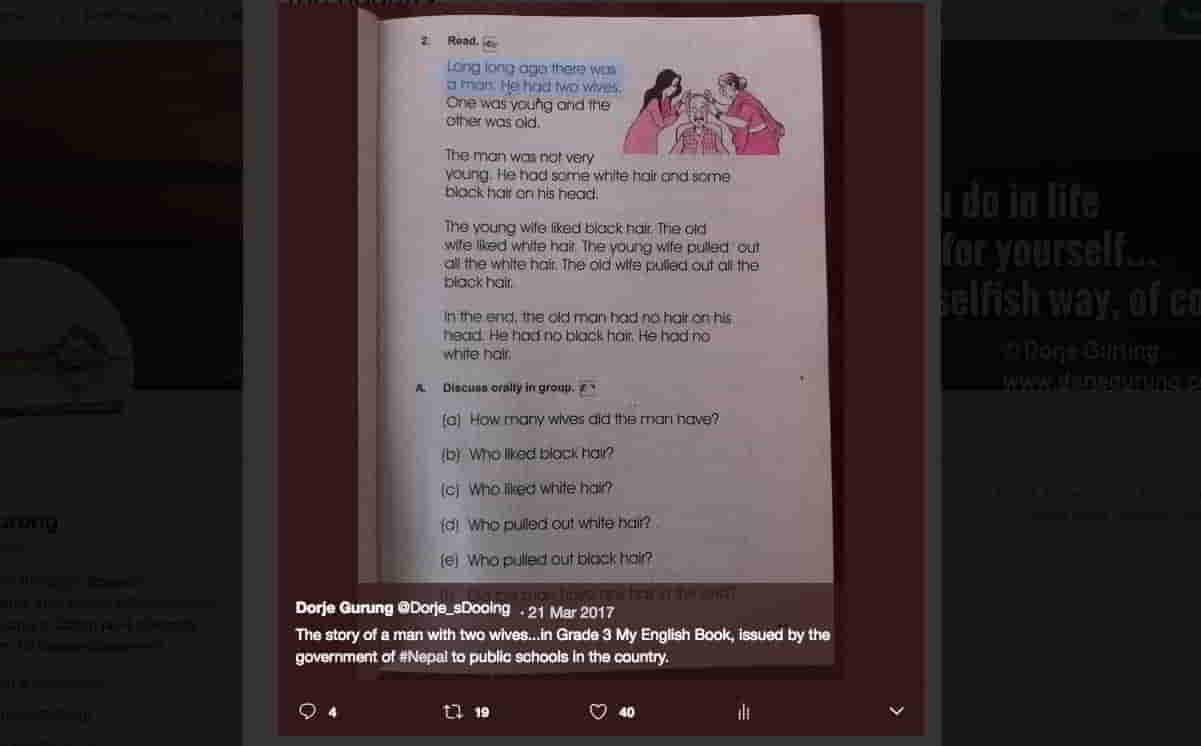The quality of textbooks produced and published in Nepal is poor, the ones issued — for free — by the government to students at public (government) schools, worse than those issued by private schools. The blog post When A Textbook In Nepal Fail Children, details the issues with a Grade 1 textbook issued to my nephew by his school, a private school.
The following came from Grade 3 My English Book issued by the government. (Children in Grade 3 would be 8 years old, if they started school at the right age.)
The story of a man with two wives…in Grade 3 My English Book, issued by the government of #Nepal to public schools in the country. pic.twitter.com/hTYbxSravO
— Dorje Gurung (@Dorje_sDooing) March 21, 2017
Polygamy is against the law, though I have been told it does happen. One of the reasons for that is the lack of enforcement of the law. The other reason is that Nepal is a highly patriarchal society and having multiple wives is viewed as a status symbol. Back in the nineties, I discovered having (a) mistress is also a status symbol in Kathmandu!
A couple of years ago, an acquaintance of a cousin of mine sharing details of his family, revealed the fact that his father had two wives! He basically bragged about the fact that the father was such a “player” that he got away with it! At the time, the father was away visiting his much younger wife in another city!
Dol Bahadur Khadka whose children’s education COMMITTED has been supporting following his death in Qatar, had two wives!
Another page from the same book. This one is supposed to be the kid’s song The Hokey Pokey.
The Hokey Pokey in Grade 3 My English Book, issued by Govwrnment of #Nepal 2 public schools in d country. pic.twitter.com/36AdxiEx7V
— Dorje Gurung (@Dorje_sDooing) March 21, 2017
As you can see, they have done a number of things to the song! The author has taken complete liberty with the title. What’s the foot in the original song has become the hand in this, the five verse song has been reduced to two, and those are just for a start! Anyway…
One more page from the same book. This one is supposed to be a phone conversation between two friends.
Another one from Grade 3 My English Book. This one’s a phone conversation between two friends. D highlighted bit is hilarious! pic.twitter.com/0v2TABNdxI
— Dorje Gurung (@Dorje_sDooing) March 22, 2017
There is something commendable about the “Hello!” Unit though. They have used a Tibetan name (Pemba) for one of the characters!
A vast majority of the school-going children attend public (government) schools. Many of them in a district like Jajarkot, they are lucky if they get their hands on their textbooks, forget about quality textbooks!
Jajarkot district. “Final exams came but the books didn’t.” 20% students yet to receive textbooks! #NepalEducation https://t.co/J1kCqqA0N1
— Dorje Gurung (@Dorje_sDooing) December 27, 2016
I would love to learn about all the steps and processes involved in a textbook going from the hands of the author as a manuscript to the hands of our children as their textbook. Something must go horribly wrong in one or more of the steps or processes. Or, the whole system could be completely flawed and corrupt.
You don’t happen to know anything about that, do you?
* * * * * * * *
References
Added after the publication of the blog post because of their relevance.
Kantipur (Aug. 6, 2018). अनुसन्धानमै बित्यो एक वर्ष | (A Year Gone Already in Investigation). This is about the corruption case Commission for the Investigation of Abuse of Authority has brought against Sajha Prakashan, public publishing house that produces all the textbooks public educational institution around the country use. “कर्मचारीका अनुसार [महाप्रबन्धक डोलिन्द्रप्रसाद] शर्माकी श्रीमतीको नाममा रहेको अक्सफोर्ड पब्लिकेसन र समिसम प्रकाशन नामक संस्था शर्माकै रहेको र समान प्रकृतिको संस्थाका सञ्चालक साझा प्रकाशनमा पदाधिकारी बन्नु नियमवालीविपरीत छ ।”
Nepali Times (Sept. 14, 2018). After quantity, Nepal’s education needs quality. “Inadequate training of teachers and over-reliance on defective textbooks keeps learning sub-standard.” [Added Sept. 20, 2018.]
Nepali Times (Aug. 7-13, 2015). U r welcome, wanna cu ASAP 4 a drink. “Textbooks in Nepal’s schools aren’t just outdated, they are outrageously bad.” [Added Sept. 20, 2018.]

